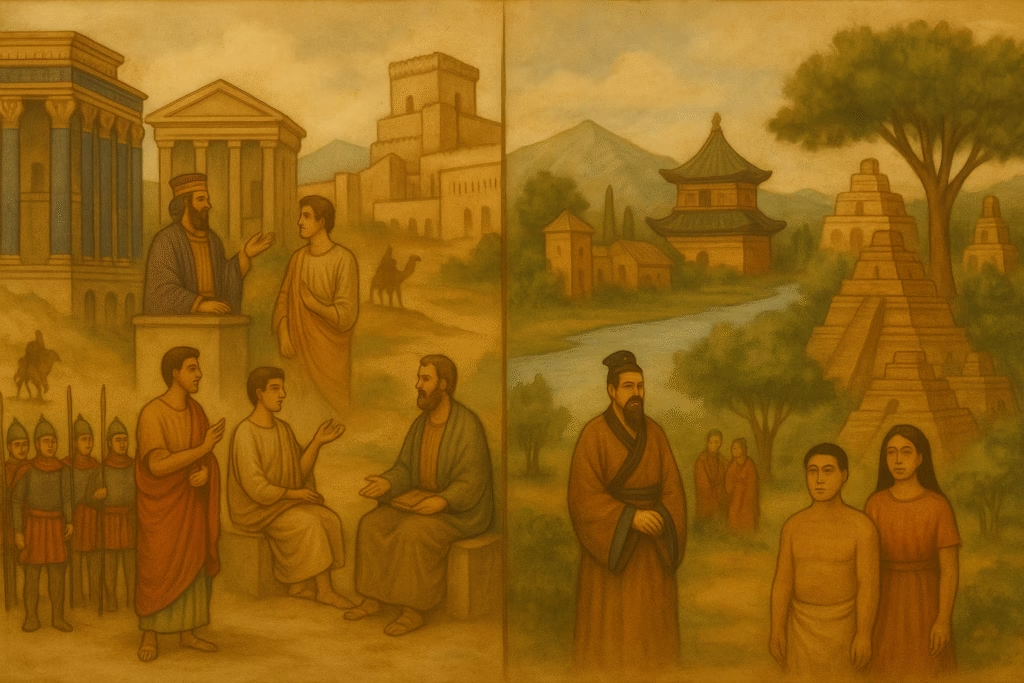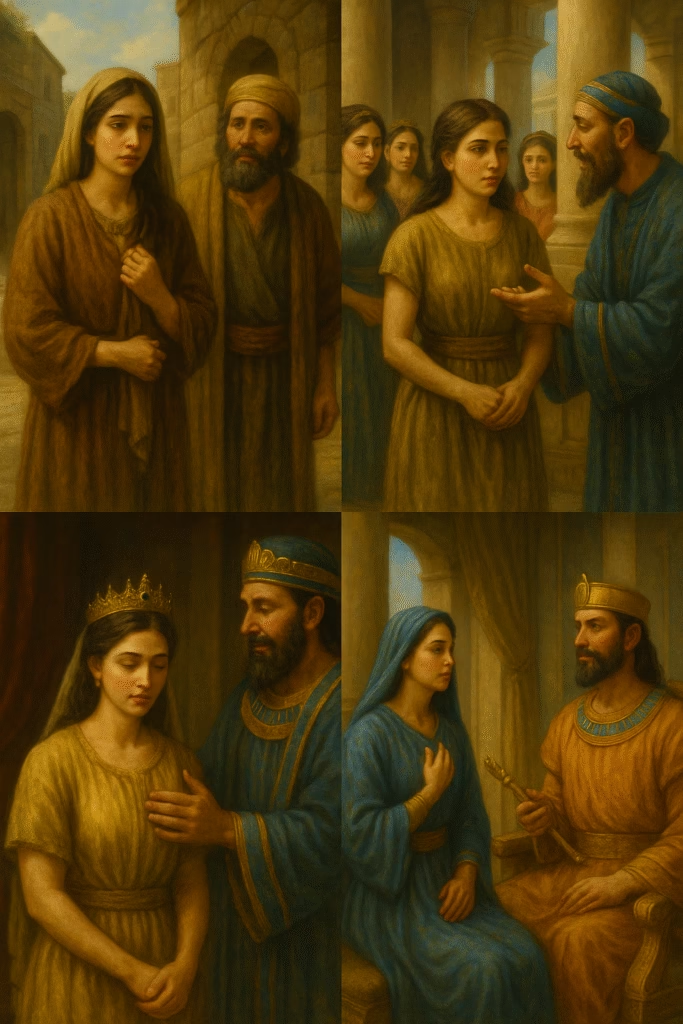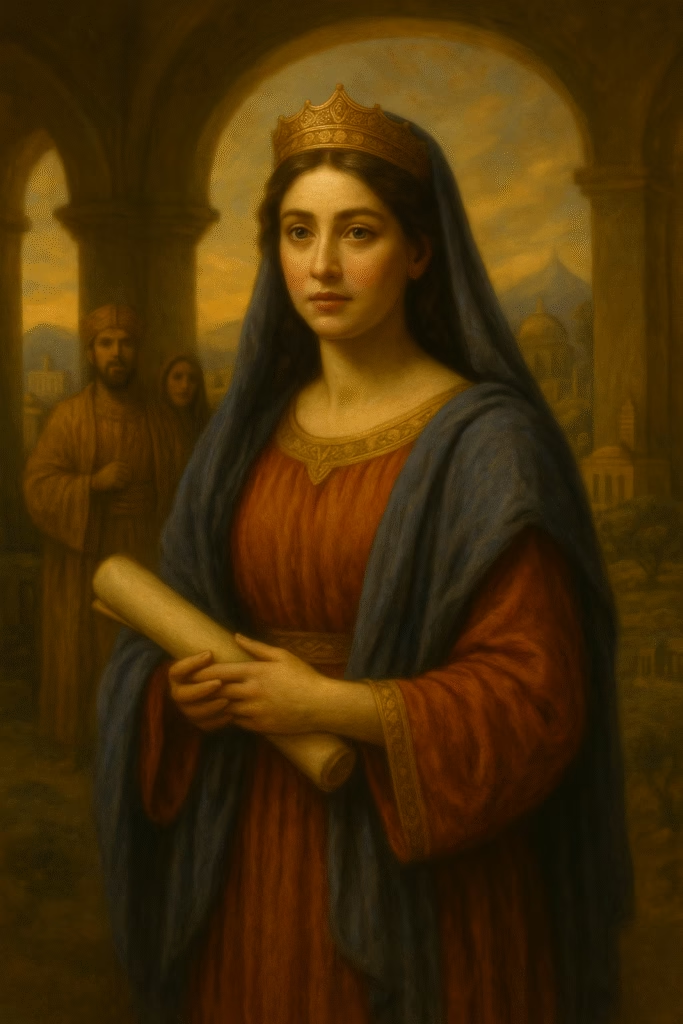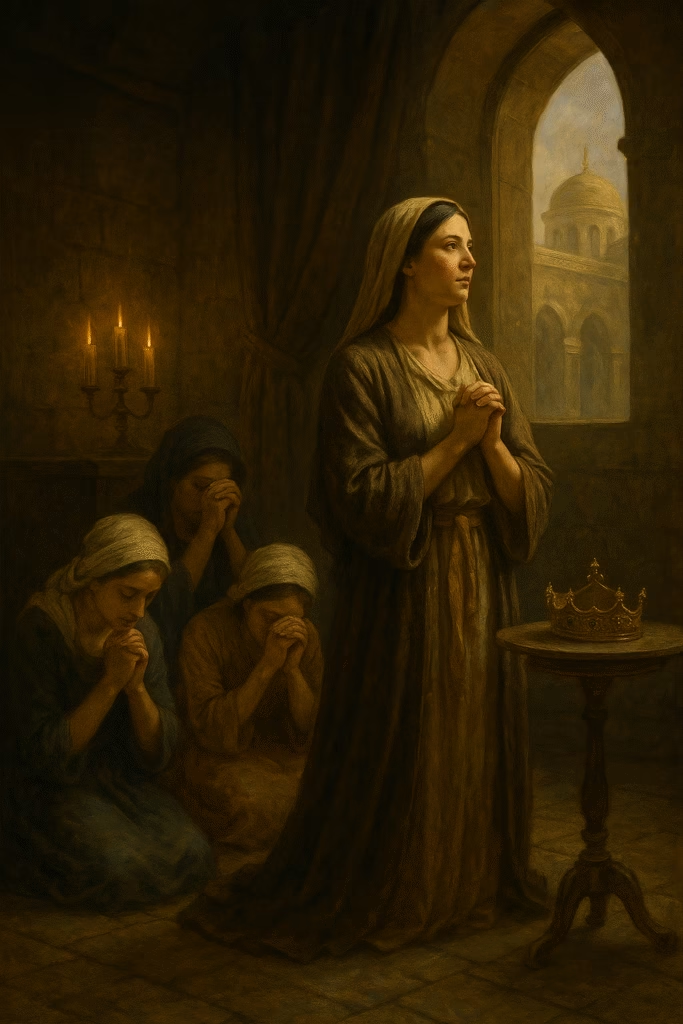
Why study the life of Esther?
There are moments in life when silence feels more comfortable.
But God calls us to act when silence could cost lives.
Esther was a woman thrust into a story she didn’t ask for, in a place where she seemed to have no voice…
And yet, when the moment came, she rose with faith, with wisdom, and the conviction that God had placed her there for a reason.
Studying her life reminds us that there’s no place too far, and no role too strange, for God to use for the good of His people.
Brief Biography
Name: Esther (Hebrew: Hadassah, meaning “myrtle”; Esther, of Persian origin, meaning “star”)
Parents: Not mentioned; orphaned at a young age
Guardian: Mordecai, her cousin or uncle, who raised her as his own daughter (Esther 2:7)
Origin: Jewish, of the tribe of Benjamin, part of the diaspora in Persia
Time period: During the reign of King Xerxes I (also known as Ahasuerus), 486–465 B.C.
Husband: King Xerxes, emperor of Persia
Children: Not mentioned in Scripture

What was happening in the world when Esther lived?
- The Persian Empire was the largest in the world, stretching from India to Ethiopia.
- Jerusalem was undergoing restoration after the Babylonian exile, but many Jews, like Esther, still lived in foreign lands.
- In Greece, the Greco-Persian wars were taking place.
- In China, the Zhou dynasty was growing in influence, promoting philosophical thought.
- In the Americas, Zapotec and Moche cultures were advancing in art and architecture.
In this setting of political power, palace intrigue, and exile, God raised up a young Jewish orphan to preserve the life of His people.
Why is Esther important in the Bible?
Because she was:
- A key instrument in saving the Jewish people from Haman’s plot of extermination
- A woman who risked her life to obey God, appearing before the king uninvited
- The main figure in the only book of the Bible that doesn’t directly mention God by name—yet His hand is evident in every scene
Her story is still commemorated in the Jewish festival of Purim, as a testimony that God never abandons His people—even in foreign lands.

What was her position in society?
Esther began as an anonymous orphan, with no rights and no resources.
She was brought to the palace as one of many young women meant to please the king.
But God gave her grace and favor, and she became queen of Persia.
Not by ambition, but by divine purpose.
She did not use her position for comfort…
She used it to fulfill an eternal calling.
What was her personality like?
Esther was:
- Submissive and obedient to Mordecai, even after becoming queen (Esther 2:10, 20)
- A woman of wisdom and character, knowing how to act at the right time
- Courageous, risking her life by appearing before the king without being summoned (Esther 4:16)
- Strategic, planning banquets to reveal Haman’s betrayal
Humble and reverent, calling for fasting and spiritual support before taking action

Why will she always be remembered?
Because she was a woman not born to be queen—but born to intercede.
She will be remembered for her iconic words, spoken with obedience and courage:
“And who knows but that you have come to your royal position for such a time as this?”
— Esther 4:14 (NIV)
What can we learn from her?
- That God is at work, even when He isn’t mentioned
- That obedience and courage go hand in hand
- That positions of influence carry spiritual purpose—not just comfort
- That waiting for the right time is part of God’s wisdom
That true faith acts through prayer and brave decisions

Key Passage
“Go, gather together all the Jews who are in Susa, and fast for me.
Do not eat or drink for three days, night or day.
I and my attendants will fast as you do.
When this is done, I will go to the king, even though it is against the law.
And if I perish, I perish.”
— Esther 4:16 (NIV)
What was her relationship with God like?
Though the book of Esther never explicitly mentions God, her life reflects deep faith:
- She fasted before acting
- She trusted Mordecai’s guidance, knowing it was divine
- She believed her position was not random—but a call from God
Her faith wasn’t loud or flashy—it was quiet, strategic, and faithful.
And God moved through her courage and obedience.

What would Esther do today?
She would rise in the face of injustice.
She would fast with her community before taking action.
She would use her influence to speak for those without a voice.
And she would keep trusting that God is working—even when He seems hidden.
Prayer
Lord, like Esther, call me to be brave at the right moment.
Give me grace under pressure, wisdom to speak, and humility to depend on You.
Wherever You place me, help me see purpose.
And if I must risk something, let it be for love of You and Your people.
Amen.
To Reflect on This Week
- Esther 2:15–18 — Esther found grace and favor
- Esther 4:14–16 — The call to courage
- Esther 7 — God reveals what is hidden and saves the innocent
“Esther was not brave because she lacked fear…
She was brave because she believed her calling was greater than her fear.”
Related
Discover more from Christ Reigns Media
Subscribe to get the latest posts sent to your email.
